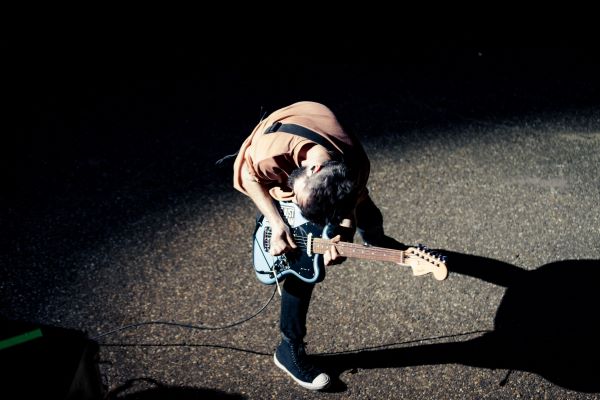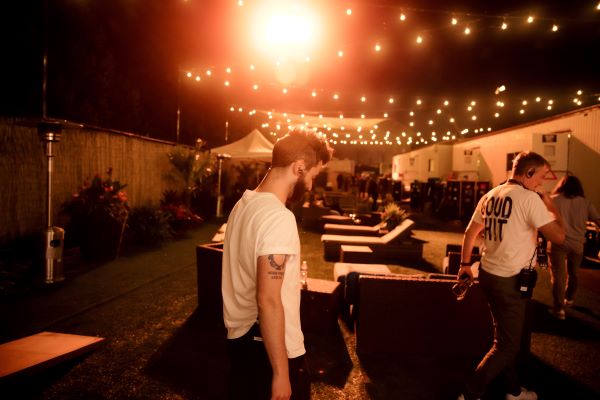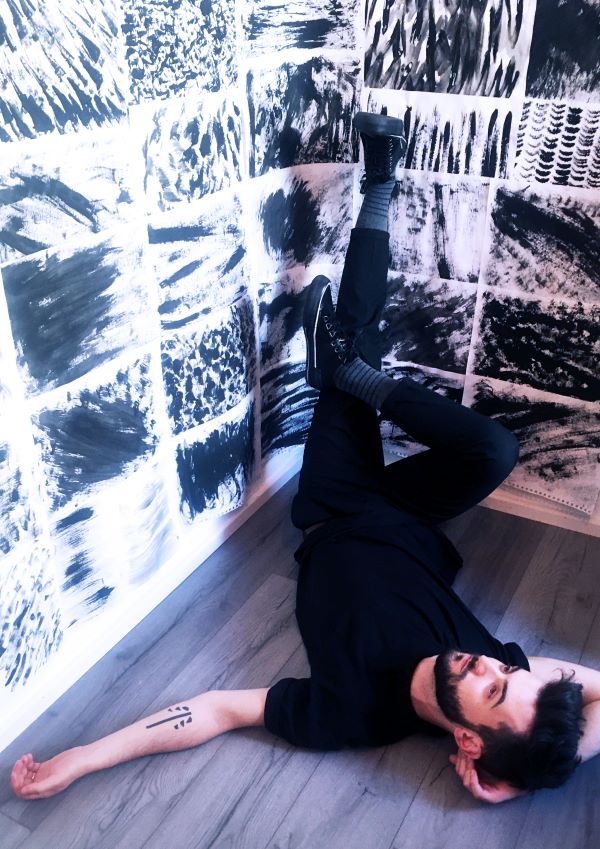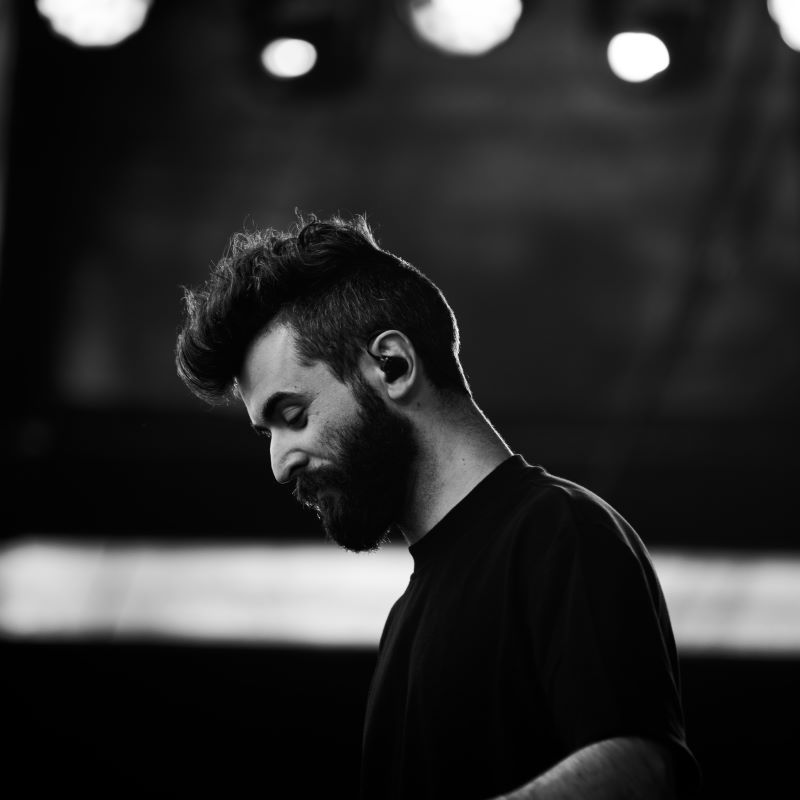By Sally Churchward. Image credit: Joe Horridge.
Charlie Barnes’ latest album has been three years in the making and counting.
Like so many other musicians, he squeezes his passion – writing, recording, booking gigs in toilet venues – between the demands of his day job, family and the general business of life.
But unlike many other musicians, his day job doesn’t see him pulling double shifts at a coffee shop or tending bars. Instead, it takes him on global tours playing to thousands in sold out arenas, as a touring member of internationally successful band Bastille, boosting the band’s live sounds with his guitar, keyboards, percussion and impressive vocal range.
Charlie throwing himself around the stage and landing head over heels whilst playing his guitar has become a familiar sight to fans of the band and he’s become an increasing part of the furniture since he auditioned for the band back in 2015. The wall of his home studio bears a gold disc he got with Bastille and he took centre stage at the band’s MTV Unplugged session, which he also scored.
In many ways it’s a fairy-tale dream come true – albeit not quite his fairy-tale dream. And like all fairy tales, Charlie has spent his share of time fighting demons in dark woods along the way.
When he got the audition to join Bastille, as well as working on his solo career, Charlie had joined a band in the interest of generating a more reliable income. But rather than being with a gold-selling outfit, it was a wedding band.
He got the Bastille audition through a friend – Stephen from the band Revere – who he’d worked with previously and who had heard that a stadium band was looking for a session musician to play live shows Charlie thought it was worth giving it a go.
“It wasn’t said to me at any point that it was Bastille but I looked at the management company and some stuff about Bastille and thought ‘it’s obviously them – I’d better listen to their music,’ because I’d never heard it before,” admits Charlie.
“I knew the name but I didn’t listen to the radio and I didn’t have a TV. I put it on and thought ‘oh, this is cool.’ I liked the fact that their massive hit (Pompeii) didn’t have the name of the song in it, which is a bit weird for a pop hit, and the album ticked a lot of the same boxes I was sort of trying to tick when I was in my early 20s and doing stuff that was a bit less rock-orientated.
“I listened to them for the next couple of months and worked out the chords in case I got an audition.
“The audition went really well and I essentially had to be dragged out of the room because they had to see other people. I felt I probably hadn’t got it as there was probably some shit hot session musician going to wipe the floor with me but I’d had a nice time and they seemed to like me and I didn’t do anything wrong.
“They didn’t call for several days and I assumed I hadn’t got it. Then they rang to say I had the gig and I had to tell my coffee shop boss that I’d finish out my shift but I’d be leaving.”
At the time, as well as making his own music – his label debut album was about to be released – Charlie was also touring with one of his favourite bands, Amplifier.
Charlie had fallen in love with music aged seven, when he saw Queen VHS tapes at a family friend’s house. He wanted to be Brian May, and, after getting a classical guitar and going off the whole thing for a bit, he got into rock music in earnest at the age of 12 or 13. He got an electric guitar and joined ‘not particularly good’ high school bands.
He went on to form another band but the other members were a little older than him and when they went to university, he found himself alone, in part, he says, because he’d ‘sufficiently pissed off every other musician who’d ever been in a band with me.’ He began experimenting with using a computer and loop pedals and ‘playing in empty bars’ around Leeds, Manchester and Huddersfield.
In the meantime, he was also going to a lot of gigs. He describes himself as having been a superfan of Amplifier and Oceansize, the latter of whom he saw more than 40 times.
He contacted Amplifier through MySpace and asked to support them at a particular gig and to his amazement they said yes.
“People say you should never meet your heroes but I ended up touring with and collaborating with mine,” he exclaims.
“It was the start of a really good friendship. They’d left the label they were on. They’d had enough of the music industry and the DIY music world was in its embryonic stages. A lot of what they did was pioneering and it was really exciting to be around. They booked their own tour and took me around as their support act.
“I ended up joining the band for a bit when they needed a keyboard player and extra guitarist. It was crazy teenage dream shit.
“Then Oceansize split up and their guitarist, Steve Durose, joined Amplifier as the extra guitar player, so we were on tour together, which was obviously stupidly exciting. I got the bonus of having one of my biggest heroes to live on a bus with. I’d been a weird superfan kid who literally dressed like the band in the front row. I definitely wasn’t cool but it was fine!”

Whilst on tour, Charlie talked to Steve about his music and agreed that Steve would produce Charlie’s album, More Stately Mansions.
Charlie financed the album himself. Sadly his mother died when he was just 15 – a theme which has been explored throughout his music. He agreed with his sister to sell the house they had inherited and used his share to buy a flat and make the album, using all of the remaining money in the process.
“I sort of threw everything at it and was very confident and convinced that it was all going to work out fine,” he laughs.
“I am not the kind of person who would do that kind of shit now!”
Charlie found himself in an incredibly welcoming and supportive group of people in his corner of the music world When the album was complete, they took it upon themselves to help him get a record label, with Sel Balamir, the lead singer of Amplifier, giving it to the head of Superball music, who eventually signed Charlie, after a sometimes fraught year of negotiations.
The record deal was, he says,not quite what he’d hoped for and while the money from signing helped pay back some of his costs, it wasn’t that much of it.
It was between signing the deal and the album’s release that the Bastille audition happened.
Charlie found himself rehearsing in a studio with the band at the same time as the album came out.
It highlighted a sharp contrast between the world he’d landed in the middle of and the one he’d been working towards for all those years.
“When the record deal offer landed in my inbox, it was a couple of zeroes shy of what you always imagine those things might be and there was the realisation of ‘I’m never going to be able to make a living through making my own music.’
“I started playing in a wedding band, because I just really wanted to play music and make a reasonable living out of it, and then this flipping massive opportunity came up, which took things to a new level.
“I was super excited (to be rehearsing with Bastille) and it made it easier for me to ignore the total fucking failure of my solo career,” he laughs.
He and his own band played a couple of festivals in Germany as album release shows, “but I could never get anything going, beyond playing in coffee shops,” he says.
“The album had been finished for two years so it didn’t really matter that much. It became the case that I could ignore my solo career because now I had a proper job in music and was doing all the stuff I’d dreamed of – sort of – but from a convenient side-line vantage point. I got to have all the fun with very little pressure.”
But the dream job didn’t always feel like a dream and he found himself in some very dark places in the following years.
“It takes a few years to kill your ego off as well as you can,” he says of the tension between signing on as session musician and sidlining his own solo career.

“It was a funny one because Bastille is such a different world to what it was that I’d been aspiring to, so when I say I was doing all the things I’d dreamed of, in a way I was, but actually my ideal had never particularly been playing massive main stages at festivals or things like that. As a solo artist I wanted to be this kind of underground cult icon,” he signs ruefully.
“It was an odd one to navigate and I got pushed and pulled psychologically in so many different directions.”
Charlie began working remotely on a second album with Steve (Oceanography), which became a side focus for him and at times he found himself struggling.
Things became complicated as he negotiated the two separate but overlapping worlds he found himself in.
“Most of the time I was pretty good at managing to realise that my day job music and my fantasy world of my own music are very different realms. But there was a period around Oceanography where I got a bit confused and didn’t maybe have it in my head so clearly that they were different things.”
Charlie found himself making an album with the intention of being more accessible – not just as a result of working with Bastille but also realising how difficult his label had found it to market his previous album.
“The lines got blurred and it was harder to work out where one stopped and the other started.”
Charlie says that while he is now in a good place, over the years he’s had to face some personal demons, as well as working through grief at the loss of his mother when he was so young.
“There have been some really, really dark periods,” says. “I was a total mess with it. There have been prolonged periods of really not having a good time on stage, which was all stuff I hadn’t worked out properly, and beating myself up about stupid mistakes, none of which matters in retrospect but it’s very easy for me to say that now – it wasn’t so easy at the time.
“I slightly hesitate to use the very overused but nonetheless accurate phrase of ‘imposter syndrome,’ but I had a real bad case of that, amongst some other shit”
He adds: “Even in my own performances, there was a point touring with Oceanography, where we played our big London show in 2018 and on paper it was the pinnacle of all the stuff I’d hoped for for so long, but I hated it. I absolutely hated every second of it and ended up after the show in floods of tears in my mate’s car because I felt so crap about the whole thing.
“It’s a funny old thing, being a musical performer and sliding between two very different musical worlds.”

Charlie adds that these days he mostly loves what he does – “in the last couple of years I’ve been in a much better place with it” – and (almost) giving up alcohol has, he says, definitely helped.
It’s one of the topics he covers on his new album – which he hopes to release early next year.
“I wasn’t an alcoholic but in the world of rock and roll touring, it’s everywhere and it becomes that you do it all the time. There’s whole chunks of places we’ve been to that I’ve only got a very hazy memory of.
“It’s easy to paint it all in a bad light, when actually a bunch of that has been the best time and we’ve had such a laugh, but it’s fine to do that when you’re in your 20s and don’t have children. Of course you’re going to – it’s a wild party. But at some point between lockdowns 1 and 2, I met up with a few mates from school for a socially distanced drink, had four beers and felt terrible for days. Afterwards I thought ‘I’m done’.
“I’ve had lots of periods, since I started drinking legally, when I’ve given it up for a while.
“That’s mostly been from a mental rather than a physical angle – trying to do all sorts of things people tend to do when they lose a parent when they’re young, so trying to set a high moral compass or exercise some level of control over their life.
“My wife was also expecting our son so it seemed like a good time to stop. I stopped for ages and now only occasionally share a glass or two of wine with her at home.”
Now there are always alcohol free beers on Bastille’s rider and Charlie says others have got into them too.
“I just don’t need it anymore, I don’t want it anymore,” he adds.
“I have been quick and easy to hit the deep pits of self-loathing, and alcohol is an express train ticket to that. Since I got rid of it, more or less, my consciousness is a lot more well balanced.”

Charlie – ever an autobiographical writer – has penned a number of songs about his changing relationship with alcohol. Another subject which features on the forthcoming album is his feelings about becoming a dad to his son, who is now almost three.
“It’s been an enormous transformation and a giant – I don’t even know what the word would be!” he says about parenthood.
“It’s simultaneously magic and totally terrifying and I’ve had my struggles with it. It brings up all sorts of things you haven’t quite dealt with and you put yourself under a microscope on very little sleep!
“In the new stuff I’ve written, there’s a lot about becoming a dad and the time before it, basically the journey towards fatherhood, but I haven’t written anything since.”
Charlie, who has a reputation as a prolific writer, also penning songs for a side project The Society Pages, says he doesn’t know if he will continue as a songwriter.
“I’ve hardly written any songs for the last couple of years and I just don’t know how much more I’ll do,” he says.
I just don’t think I’ve got the inclination to do it anymore. Writing songs is a weird thing. I don’t really feel like I’m the person to do it anymore, particularly.
“I really love making music and recording things and choosing notes etc but when it comes to writing words down, I wouldn’t be surprised if this is the last thing I do – but I also wouldn’t be surprised if I had a sudden wave of inspiration and wrote a load of stuff!”
He adds that he had something of a revelation when discussing grief and creativity.
“I realised that this body of work is the first thing I’ve written which doesn’t have anything about my mum in it. That was a big realisation.
“There are a couple of songs for previous projects where I wrote about it in very plain terms and I guess there was a point where, because I had written about it so plainly, I didn’t really think I’d got anything left to write about it.
“I think in terms of being a dad, it feels a bit too sacred to write about.”
But whatever Charlie does, he won’t be disappearing from the music scene. He’s very much the fifth member of Bastille and that ‘day job’ keeps him busy. He’d also like to tour with his new album, and with tickets selling quickly for his latest show and a previously announced one selling out – unheard of for him, he says – that could be more appealing.
In the meantime he’ll be entertaining his followers via his Patreon account (a crowdfunding community) and Instagram, with his annual live Christmas show coming up soon.
“I don’t feel like I have fans but I feel I’ve got like a good few handfuls of people who pay good money to follow what I do, but because so much of that is funnelled through Patreon, it feels less like a fan relationship and more like a community,” he says, noting the echoes of his fan/follower relationship to Oceansize and Amplifier.
Charlie laughs about the low numbers on his artist Spotify Wrapped tile, adding that he likes his music being cherished by a handful of people perhaps more than if it had wider appeal.
“Thinking of the evil, evil, evil Spotify Wrapped thing, it told me I was in the top 5 listens last year for 22 people. I like the fact that my little tile it generated doesn’t look anything like the tiles that artists post on the internet. There’s no letter ‘m’ after any number in terms of streams or whatever, but there are 22 people in the world who use Spotify for whom I was in the top 5 artists they listened to last year, and that’s pretty cool. It’s a sweet thing.”
It seems, perhaps, that Charlie has achieved his underground cult icon status after all.
“That’s what music that people like me make is,” he says.
“It’s not going to sell in its thousands. It’s not even going to sell in its hundreds, but a couple of handfuls of people will cherish it.
“At the end if it all, it’s nice that I’ve got a gold Number 1 statue and a gold plaque on my wall and all that stuff from my other world, but in terms of the stuff that I’ve made, which is actually me, bearing my soul, it’s nice that there are a couple of handfuls of people who understand it.”
- Charlie has a headline show at Folklore in London on January 29, 2024. Tickets are selling extremely fast. Click here for more details.
- Charlie is supporting To Kill a King on select tour dates, in Manchester, Leeds and Nottingham. For tickets click here.
- Find Charlie’s Patreon here.
- You can follow Charlie on X here, Facebook here, Instagram here.
- In Common is not for profit. We rely on donations from readers to keep the site running. Could you help to support us for as little as 25p a week? Please help us to carry on offering independent grass roots media. Visit: https://www.patreon.com/incommonsoton
You may also like:
Bastille on songwriting, being good allies and “the ‘eh, oh’ song”
Review: Storming Bastille – PennFest, Buckinghamshire, Saturday July 22
Review: Bastille – Bad Blood X Tour, Alexandra Palace, July 14, 2023
Interview: Will Young – pop star turned activist, on animal testing and more

